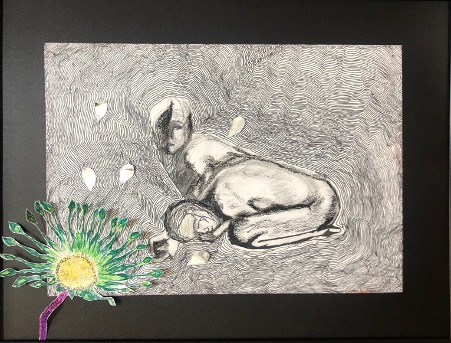
I first met Malika Ibragimova in 2019. Impossibly modest yet strong, she has very clear, conscious views on life and feminist values that are close to mine. She is a woman who does not consider herself an artist, but simply draws for herself. Malika told me about her veganism and how she came to choose that path. For her, veganism is not just a rejection of meat and dairy products, it is a very sensitive and careful attitude to all living beings, an expression of love and compassion for them: “You don’t ask the cow if it can be milked. And if you do, she won’t answer you. Therefore, I refuse to take milk from the cow, because she will not answer me.” To my argument that if you don’t milk the cow, it is uncomfortable for the animal, Malika replied: “It is not necessary to raise it for this. A cow cannot give milk all year round; it is unnatural for her. They are stuffed with hormones and quickly become exhausted and die.” I thought what a huge heart a person must have if she thinks like this about a cow that no one else will think about, that no one wants to think or care about.
I was very impressed. I have rarely met a talented artist lacking such a sense of their “genius”, who does not pay attention to their obvious talents, but rather keeps silent about them. The art community is usually full of snobbery and self-aggrandizing. And so even then, I thought that it would be nice if such an artist as this had an exhibition.
In the winter, we sat at Malika’s home with friends and imagined how good it would be if Malika could hold an exhibition. And then in the spring of 2021, this project was supported by my art team CI, and we started preparing the exhibition. The opening of Malika’s exhibition, The Dance of Anxious Silence, took place on 25 April 2021 and featured a DJ set specially prepared by her.
This is an interview with Malika about her work as an artist, creative therapy, ecofeminism and veganism.
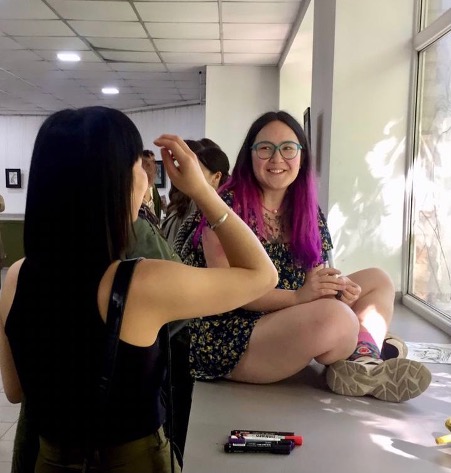
Adele: Is your creativity related to your choice to be a vegan? Or with your political position? I just think that we treat a woman like a piece of meat, that we have a very patriarchal society and for me this also has a connection with nutrition.
Malika: Well, I am generally a supporter of ecofeminism, especially radical ecofeminism. One of the main treatises says that industrialism, patriarchy and capitalism are all one system that is directed against women, animals, nature and all that. That a woman is, for patriarchy, capitalism and industrialism, on the same level with animals – merely an object of exploitation. And here, even for me, this is a controversial point, because non-radical ecofeminists are against identifying a woman with nature. Because then it turns into the objectification of a woman, some kind of dehumanization; that a woman is just a resource, just like nature. On the contrary, I do not agree that nature and the whole surrounding world, flora and fauna are objects for exploitation. And I feel that I am closer to nature, because I am against these three pillars of exploitation over us. I am in favour of a woman being closer to nature, because we are more empathetic and kinder. We are all persecuted and understand each other better. In my work, I like to show the female body as it beautifully harmonizes with nature and animals. In the drawing with Lelouch [Malika’s cat], this is about the fact that I am the mother of Lelouch and the mother of the whole world . . .
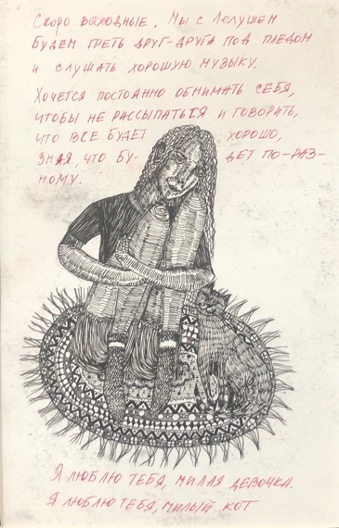
Translation: “The weekend is coming soon. Lelouch and I will warm each other under a blanket and listen to good music.
I want to constantly hug myself so as not to crumble and say that everything will be fine, knowing it will be different.
I love you, sweet girl.
I love you, cute cat.”
I like to depict myself with a cat and surrounded by trees or flowers. Here is a drawing of a fish-woman and it seems to me that we are all on the same level, that we are all equal. I want all people to think like this, not only women and the persecuted, but everyone. That a man is also equal to us; he is not above us and does not need to destroy everything that he sees around him now. On the contrary, he can stand next to us, take us all by the hand and together we will protect what we have and love it.
Adele: Many of your works are devoted to the topic of the female body, self-acceptance and self-love.
Malika: I was a very shy girl, because a girl should be. Submissive, tolerant and sweet. I was told, albeit indirectly, that I am second class, someone’s supplement. I grew up misogynous, although I did not accept the rules of the game that are imposed on me. I wanted to be a boy, because they can be different and express themselves in every possible way. I was ashamed of my body and all its manifestations, its imperfections. I sincerely believed that I was worse than men and many women, because they fit much better into the framework into which society is trying to drive us. I didn’t understand my own emotions very well, but I experienced mental anguish from the fact that I can’t be beautiful and “correct”.
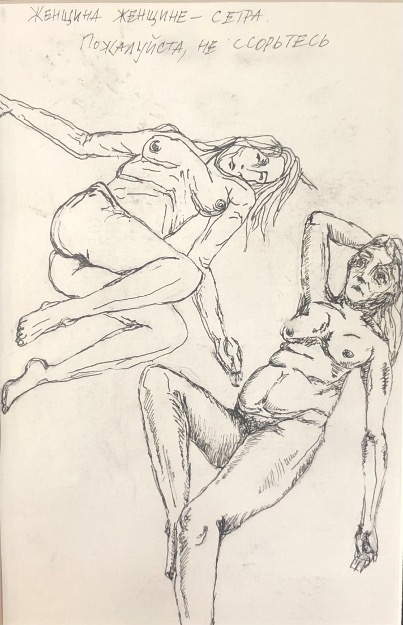
Translation: “Women are sisters. Please don’t quarrel.”
The untitled portrait is like a grown-up girl. Her face is unhappy and ugly, but she is no longer afraid to look straight at herself. I came to feminism around 2016 and it helped me finally accept and love myself. The last drawing is about my female nature. I am closer to nature; I am harmonious. I am, and therefore it is necessary. My body is a child of nature. I am a woman and I am strong. I can do everything and I have the right to do it.
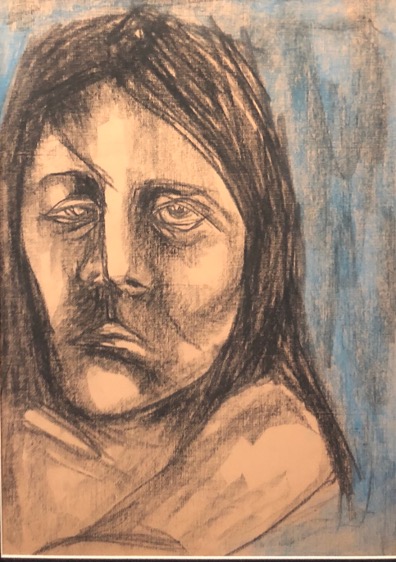
Adele: I know that creativity functions like therapy for you, a way to cope with feelings and emotions. Tell me about your emotions. How emotional are you? How do you cope with the emotions in your drawings or through other means?
Malika: I’m more emotional than unemotional. Although it is very difficult for me to take out my emotions and understand them. I just feel some discomfort and what came over me. I know that, but I do not know what it is and how it is. I’m learning to cope with this. But the simplest and easiest way for me is just to turn on the music and just sing – or to draw. I feel that something has come, it is pressing on me. I sit down and start to draw something, and in the process, I get inspired and begin to draw what comes into my mind. Sometimes nothing works out, but I just feel some kind of relief that it’s gone, this unpleasant, uncomfortable feeling; it leaves me and things become easier. I sometimes even feel very tired after a drawing session; I may lie down for an hour, but I feel better. Most often these are negative emotions; it rarely happens that something good inspires me to draw.
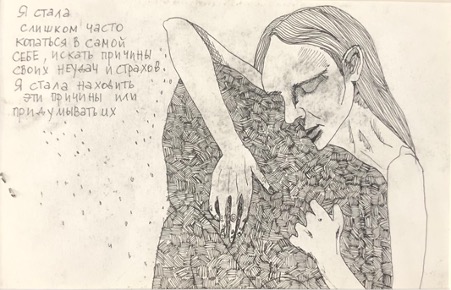
Translation: “I began to dig into myself too often, looking for the reasons for my failures and fears. I began to find these reasons or invent them.”
Adele: During the preparation of the exhibition, I learned that a significant number of the works were made by you when you were experiencing severe anxiety.
Malika: In 2017, I drew a lot. This was a time when I started to conduct internal dialogues with myself, when I stopped rejecting myself and my feelings. I often suffer from anxiety impossible to alleviate, when it seems that something terrible is about to happen. I carried her on me like a black dog; she pressed on my shoulders and neck, biting my ears, and at night lay down like a heavy load on my chest. I wanted to scream all the time out of despair and fear. Drawing helped me a lot. I poured out feelings I didn’t understand on paper, using unnatural poses and colours to personify the wrongness of what was happening.
It was during this period that I drew The day of giving up the struggle and the series Internal Dialogue.
Adele: For me, as an artist and a person who is familiar with your work, I would like to know more about what spirituality means to you.
Malika: Oh, that’s an interesting question. The first thing that comes to mind is harmony with your . . . Well, I don’t believe that we have a soul of some kind, but for me the soul is probably in the subconscious. There are some principles, to be in harmony with what is inside you. Each person relatively and clearly understands what is good or bad for him or her, so he or she can be honest with himself or herself. You often ask yourself and answer the question: Why do I do this? Spirituality for me is something related to awareness. It is a necessarily kindness, it is empathy.
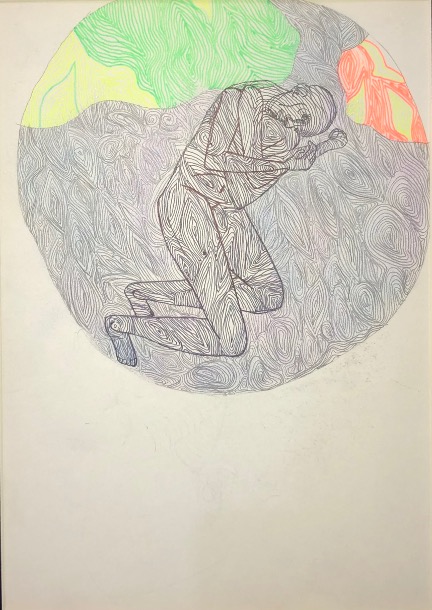
Adele: You are following the path of veganism and this is a very conscious choice for you. You said at the beginning that you are afraid to agitate, but is there a desire in you to call people to this path? What would you like to say to end our conversation?
Malika: I rarely make any appeals and most often I only agitate to people who are close to me, because I feel that I have little right to do so. People who are close to me won’t perceive me as aggressive. As it is, I try to respect other people’s choices and not put pressure on anyone. But I advise you to watch the movie Earthlings narrated by Joaquin Phoenix just to learn more about veganism. I didn’t watch it myself, because I’m always going through some kind of suffering. For example, winter is a terrible time for me, not because it’s cold. After all, at least I have a house. But all the time, especially earlier in my school years, even though I ate meat and did not think about anything at all, I remember that I cried very often in the winter. Because homeless animals freeze on the streets and I would wonder how that can happen. Why does someone suffer all the time? But this is basically connected to all people. Women and children also suffer a lot. just like animals, and all the time, not only in winter. Such thoughts constantly weigh down on me and this is probably the main reason for my suffering. It seems to me that if everyone thinks about it, then we will probably want to change things. We will want to do something, to help. My call to people is just to look around, see how many terrible things are happening and try to stop it somehow. Start with yourself. We should start with ourselves. If you want something to get better, do something yourself. Don’t agitate others; start with yourself.
- License:
- CC-BY